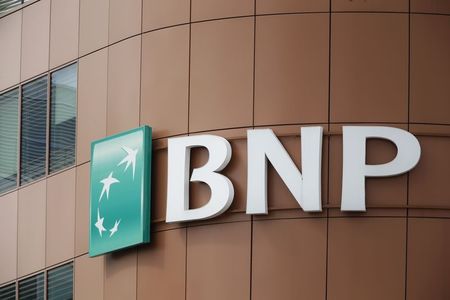Adaptimmune stock plunges after announcing Nasdaq delisting plans
Investing.com - French banking shares fell on Monday, with analysts suggesting that some investors may be consolidating their positions following a rating downgrade of France by S&P Global.
Pressure also came after a jury awarded roughly $20 million to three plaintiffs as part of a broader class action alleging that BNP Paribas -- Europe’s biggest lender by assets -- had helped finance genocide in Sudan, according to analysts cited by Bloomberg. The news agency said the decision may further persuade the bank to settle with other plaintiffs in the case.
By 05:49 ET (09:49 GMT), shares of BNP Paribas had fallen by more than 10%, while peers Credit Agricole and Societe Generale dropped by 3.5% and 2.5%, respectively.
In a suprise update on Friday which came outside of its regulated schedule, S&P Global slashed its rating of France to "A+/A-1" from "AA-/A-1+."
S&P Global said the decision was warranted following a week of deep political turmoil in one of Europe’s largest economies, during which Prime Minister Sebastien Lecornu promised to suspend an unpopular pension reform push and endured two no-confidence motions.
Lecornu ultimately survived both of these votes in parliament, although the fate of his 2026 budget, which he has also presented, remains murky. Lawmakers in parliament are due to begin reviewing the budget on Monday.
"Despite this week’s submission of the 2026 draft budget to the parliament, uncertainty on France’s government finances remains elevated," S&P Global wrote in a statement.
"While, in our view, the 2025 general government budget deficit target of 5.4% of GDP will be met, we believe that, in the absence of significant additional budget deficit-reducing measures, the budgetary consolidation over our forecast horizon will be slower than previously expected."
They added that the crisis will impact the wider French economy by weighing on investment activity and private consumption. But they said the passage of a budget by the end of 2025 would offer more clarity around how France intends to address its increasing debt obligations, which is set to spike to 121% of gross domestic product by 2028. At the end of last year, it stood at 112% of GDP.
"The survival of the Lecornu government removed near term risk of political instability, but it does not address fiscal concerns," analysts at Jefferies said in a note. They also flagged a "high risk" of a similar downgrade from S&P Global peer Moody’s, saying this could partially "force institutional investors to reduce some of their French exposure."
